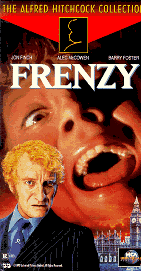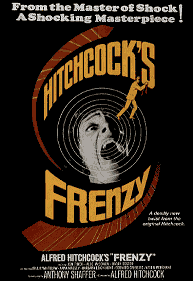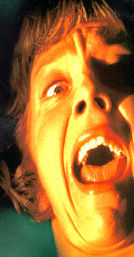
directed by: Alfred Hitchcock
starring: Jon Finch, Alec Mc Cowen, Barry Foster, Billie Whitelaw, Barbara
Leigh-Hunt, Vivien Merchant, Anna Massey, Bernard Cribbins, Michael Bates, Jean
Marsh, Clive Swift
choice
dialogue:
"You know Babs, you're my kind of woman."
(review by Mike Sutton )
FRENZY is one of the unsung masterpieces of Hitchcock's later career. It demonstrates that Hitch had not "lost it", despite what the reactions to his previous film, TOPAZ, suggested.
Whereas TOPAZ was a studio project forced upon him by circumstances beyond his control, FRENZY was a labour of love. For the first time since THE MAN WHO KNEW TOO MUCH, Hitch was able to work on location in London, and the reminders this must have given him of his early career evidently inspired him to a greater interest in filmmaking than he had shown since the mixed reception of MARNIE.
The roots of FRENZY go back
to 1958/59, when Hitch wanted to make a film called NO BAIL FOR THE JUDGE.
 This was a London set murder mystery which would have included a violent rape.
His associates were appalled at the idea and his favoured star, Audrey Hepburn,
refused to have anything to do with it. He relented and the script was never
filmed, although some of the grittiness informed a little film he made with
a TV crew a year later, called PSYCHO.
This was a London set murder mystery which would have included a violent rape.
His associates were appalled at the idea and his favoured star, Audrey Hepburn,
refused to have anything to do with it. He relented and the script was never
filmed, although some of the grittiness informed a little film he made with
a TV crew a year later, called PSYCHO.
In 1966, after the critical mauling he suffered on MARNIE, Hitch got interested in a project called KALEIDOSCOPE FRENZY which was to have been a violent, erotic mystery shot in a fragmented style and including frontal nudity and bloody murder. Universal were apoplectic at this idea and he dropped it, going on to make his two of his least satisfactory films, TORN CURTAIN and TOPAZ.
FRENZY is very much a product of its time - the era of STRAW DOGS, A CLOCKWORK ORANGE and WHERE'S POPPA. The violence is graphic in one sensational instance, the nudity is salacious and sniggering and the humour is as black as the Ace of Spades. Yet, with hindsight, it fits in snugly to the golden age of the Giallo. We have, in the Necktie Murderer, a fetishistic psychopath whose misogyny leads him to kill women because he believes that's what they want. He would have been an ideal candidate for teaching at the private school in WHAT HAVE YOU DONE TO SOLANGE?, another London set film that reveals the seediness beneath the stylish surface. These European films were gaining a reputation for being gritty and violent, as well as immensely stylish. A frankness in those films about sex was immensely appealing to Hitchcock's immature side; he could finally put naked female bodies on screen without being told off - although his long-time assistant Joan ... was not impressed.
The irony, and the greatness of the
film, is that given this freedom, Hitch proceeds to use it sparingly. In FRENZY
there is one graphic, painful and frankly horrible rape which ends in murder.
None of the other murders are then shown on screen. The female corpses are depersonalised
and turned into waste matter, just like the rotting vegetables which  fill
the streets of Covent Garden Market, where the film is set. For a man whose
films had shrieked sexual subtexts for many years, this film shows a disgust
for sex - and the human body - that is surprising. There are no positive male-female
relationships on display in the film. The hero, Richard Blaney, an ex-RAF officer,
is divorced from the manager of a dating agency - they cannot spend a few hours
together without him shouting death threats at her. The villain, Bob Rusk, is
impotent with women unless he can rape and then strangle them. The police inspector
is trapped in a suburban hell, with a wife who is busily using him as the guinea
pig for her exotic cookery class. The hero's best friend has a wife who is shrill
and untrusting. Hitch seems to be suggesting that the best one can expect from
marriage is tolerant acquiescence. Sex seems to be out of the question unless
it is forced.
fill
the streets of Covent Garden Market, where the film is set. For a man whose
films had shrieked sexual subtexts for many years, this film shows a disgust
for sex - and the human body - that is surprising. There are no positive male-female
relationships on display in the film. The hero, Richard Blaney, an ex-RAF officer,
is divorced from the manager of a dating agency - they cannot spend a few hours
together without him shouting death threats at her. The villain, Bob Rusk, is
impotent with women unless he can rape and then strangle them. The police inspector
is trapped in a suburban hell, with a wife who is busily using him as the guinea
pig for her exotic cookery class. The hero's best friend has a wife who is shrill
and untrusting. Hitch seems to be suggesting that the best one can expect from
marriage is tolerant acquiescence. Sex seems to be out of the question unless
it is forced.
The hero, Squadron Leader Richard Blaney (Jon Finch) returns to London after losing all his money drinking and gambling and manages, in the space of a few weeks, to lose his job and his flat. There has rarely been a less attractive hero in a mainstream thriller. Blaney is arrogant, misogynist, boorish and self-pitying. This isn't the suave, charming Richard Hannay of THE 39 STEPS; there are no innocents left in this Hitchcockian hell. Blaney goes to see his wife to beg money, but realises that he cannot stand the sight of her. His only comfort is his best, oldest friend Bob Rusk, the most popular man in the market who always has a racing tip and a friendly joke. He even proudly introduces his old mum to passers-by. We don't suspect that he could be a villain, until he turns up at the office of Blaney's wife and viciously rapes her. He then takes off his tie and we realise that he is responsible for the "necktie murders" which are plaguing London. Inevitably the plods at Scotland Yard think Blaney is responsible for the crime and he has to convince them of his innocence. Rusk manipulates events so that his friend will appear guilty, even killing the innocent Babs (Anna Massey) who seems to care about Blaney.
| to page 2 |